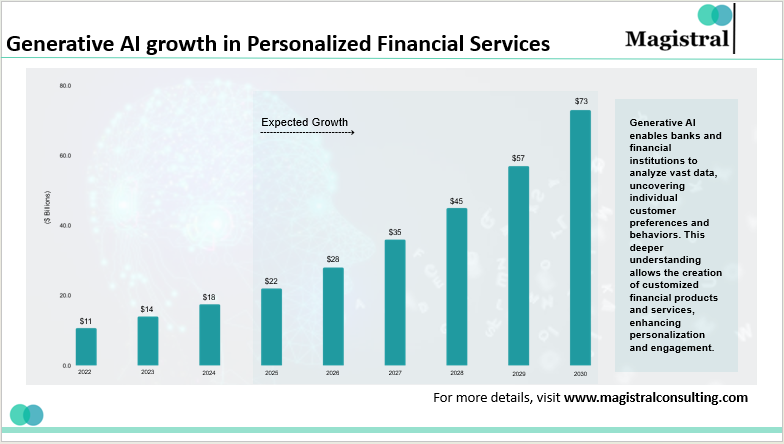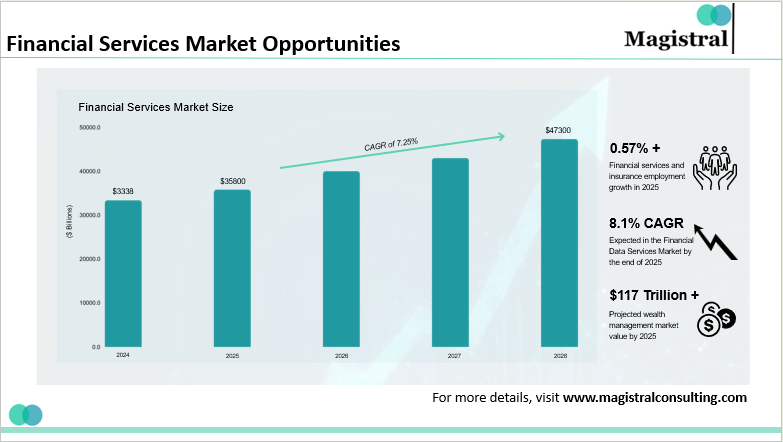The finance sector has been experiencing mixed emotions for the past four years. The industry still waits to unfold and reshape its fortune in the market. The suppression of inflation, subpar economic growth, continued geopolitical shocks, and uncertain regulatory updates are making the officials of the industry anxious. Despite the odds, leading economies like the US are expected to experience remarkable years in the future. The available sources suggest that policymakers will manage to bring inflation under control without any recessional situation. In such an atmosphere, investors require documents that provide a comprehensive picture of the trends, challenges, and opportunities in the market. This is where industrial reports for financial services take precedence. These reports allow the stakeholders to make informed decisions by keeping in mind the multi-directional factors of the market.

Generative AI growth in Personalized Financial Services
The reports are utilized in various domains to guide an informed decision-making route. Some specific ways the reports for financial services are used for:
Sagacity of investments
These reports allow the stakeholders to be conscious of where and when to invest their hard-earned earnings. Emerging technologies like artificial intelligence (AI), fintech, and blockchain are posing rapid growth in the market. Analysts forecast the global fintech market will grow at a 20 % CAGR through 2028, and they anticipate blockchain adoption in finance will rise 50 % each year. Industrial reports for financial services revealed that in 2023, fintech merger and acquisition activities surged over $90 Billion plus deal value globally.
Additionally, the assessment of these reports revealed that currently, Southeast Asia is booming in the digital payments market by attracting significant investments with countries like the Philippines and Indonesia.
Mitigation of Risk
Abiding by regulatory compliances is an imperative angle for the industry. The industrial reports help the players in the market to make their moves cautiously and provide them with all the mandates that require their attention to avoid any future breach of judgments. The reports give timely updates on evolving regulations like Payment Services Directive 3, Basel III, or anything around maintaining ESG mandates in the market. These industrial reports for financial services also give an insight into the present and upcoming operational risks, which majorly include third-party dependencies and cybersecurity threats. A summarized study of the reports reveals microeconomic data around key areas like interest rates, geopolitical risks, and credit risks prevailing in the market. A true story of these reports’ usefulness is the early analysis of economic contraction during the COVID-19 pandemic helped banks adjust their loan terms and provisions.
Adoption of better Technologies
Industrial reports hold the details of all the adopting and leveraging new technologies in the industry to meet the requirements of ever-demanding customers in the market. From an investor’s standpoint, these technological updates facilitate them to have a predictive analysis of the market dynamics. As we take a deep-dive into the current AI-enabled world, financial industries are no exception, where cases like secure transactions, digital currencies, and smart contracts are highlighted and are rapidly growing. The industrial reports for financial services are insightful for guiding firms in resource allocation and structure of the operations to harness the data for real-time decision-making. By following up on the reports, stakeholders get assurance of the benchmark following which the players within the industry are adopting the trending technologies.
Evaluation of Financial Performance
With the help of these industrial reports for financial services, stakeholders extract detailed metrics for comparing a company’s performance. It can be against equivalent and stronger competitors in the industry. The major key point indicators include default loan rates, Net Interest Margin, Cost-to-Income Ratio, and Return on Equity Ratio. It is done to analyze and study whether the strategic initiatives are helping in delivering the expected outcomes. The industrial reports for financial services also explore the new revenue streams majorly related to embedding finance and subscription-based banking models with sector-specific averages, which helps the businesses assess their financial metrics in alignment with the industry norms.
Advocacy and Policy
The policies and advocacy are crucial to reshaping the strategies and decisions of the stakeholders. The industrial reports for financial services reveal an in-depth analysis of regulatory updates and provide a scope and implications of new regulations to evaluate the potential effects of proposed laws and policies of financial institutions. Reports support the investors in making decisions that align with the regulatory framework of domestic as well as cross-border markets. In developed regions like Singapore and the UK, these reports enable investors to check and test innovative products under completely relaxed regulatory oversight. In developing countries, the same industrial reports for financial services highlight the need for regulations and restrictions. It is done to support finance-inclusive initiatives, mainly for mobile banking and microfinancing.
Financial Services Market: Adjustments, Challenges, and Emerging Opportunities
The fundamental challenge for banks is to strike a balance between their sustainable growth and microeconomic factors. These industrial reports for financial services also shed some light on how asset management competition is intensifying. Private capital is performing comparatively well compared to other asset classes, which demonstrates its resilience and reliability. On the other side, investment management firms are facing new threats along with unusual opportunities after the pandemic. As some assets are performing better in the market, the overall performance outlook remained subdued. Even after such odds, product innovation backed by customer experiences remains the drivers for the leading driver of growth. Furthermore, these firms are busy implementing technologies that will disrupt the market. It will ensure they lead the market for the long term guided by these industrial reports for financial services.

Generative AI growth in Personalized Financial Services
Magistral’s Services for Financial services firms
Magistral offers a comprehensive set of services to various financial services firms. Our aim is to provide high-quality support to its clients at a reduced cost without compromising on managerial efficiency. The following are some major industries and services that Magistral provides to its clients:
Private Equity and Venture Capital
Magistral helps global Private Equity firms to tide through resource constraints without compromising their budget. With advanced, experienced top management, Magistral brings world-class services to small and medium-sized firms. For Venture Capital firms Magistral uses an outcome-oriented formula to solve the problems of Venture Capital players.
Investment Banks
From smaller investment banks that require a balance in manpower to medium investment banks looking for quick solutions for growth, Magistral serves all, helping these diverse sizes to bloom.
Lenders
With the most complex operational process, lenders cannot go wrong with the compliance and due diligence part. Magistral ensures that each of its clients gets a boost of execution with a complete and agile due diligence process.
CPA Firms
Magistral’s expert team including a US-certified CPA, provides specialized knowledge of finance and operations for CPA firms on a budget.
About Magistral Consulting
Magistral Consulting has helped multiple funds and companies in outsourcing operations activities. It has service offerings for Private Equity, Venture Capital, Family Offices, Investment Banks, Asset Managers, Hedge Funds, Financial Consultants, Real Estate, REITs, RE funds, Corporates, and Portfolio companies. Its functional expertise is around Deal origination, Deal Execution, Due Diligence, Financial Modelling, Portfolio Management, and Equity Research
For setting up an appointment with a Magistral representative visit www.magistralconsulting.com/contact
About the Author
The article is authored by the Marketing Department of Magistral Consulting. For any business inquiries, you can reach out to prabhash.choudhary@magistralconsulting.com
What qualifications do Magistral’s analysts and managers have?
Magistral’s analysts typically have 3–4 years of experience with advanced degrees in management or finance. Managers bring 5–7 years of experience in the financial services industry, often with backgrounds in top-tier firms.
What is the Magistral’s engagement model?
We operate on a retainer-based model, where you have dedicated full-time analysts working exclusively for you.
Does Magistral get to integrate with its client's existing processes?
Yes, teams are flexible and integrate seamlessly into your existing workflows, processes, and tools.